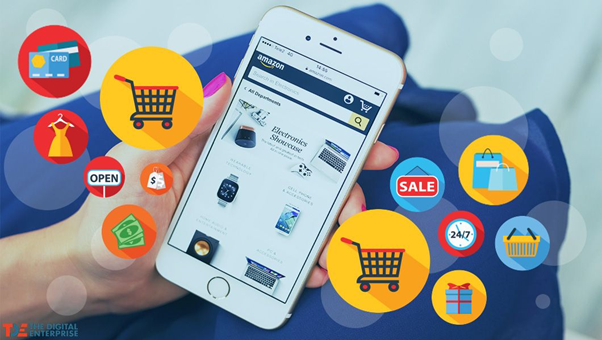Unleashing Success: Supercharge Your Leads with a Mobile Commerce App
In today's digital era, businesses are constantly on the lookout for innovative ways to expand their reach and rake in more leads. One powerful tool that has emerged at the forefront is the mobile commerce application.
So, if you want to create a mobile commerce app, buckle up and let's dive in to uncover how a mobile commerce app can revolutionize your business and help you snag those coveted leads.
In this article, we'll delve into the realm of mcommerce apps, exploring their various types, highlighting successful examples, delving into their lead-generating potential, approximating development costs, and dishing out insights on finding the right developer.
What Exactly is a Mobile Commerce App?
A mobile commerce app is a digital platform specifically designed for conducting business transactions through mobile devices such as smartphones and tablets. It equips users with the ability to browse products, make purchases, and engage with businesses in a convenient and secure manner, no matter the time or place. These apps boast user-friendly interfaces, smooth navigation, secure payment gateways, and personalized experiences, ultimately elevating the overall shopping experience.
Different Flavors of Mobile Commerce Applications
Mobile commerce applications come in various shapes and sizes, tailored to suit different business models and industry requirements. Here's a sneak peek at a few common types:
a. E-commerce Apps: These apps empower businesses to showcase and peddle their products directly to customers, eliminating the need for brick-and-mortar stores.
b. On-demand Service Apps: These apps bring service providers and customers together, facilitating instant bookings and hassle-free transactions.
c. Digital Wallet Apps: These apps securely store payment information, enabling users to make swift and secure purchases.
d. Peer-to-Peer Commerce Apps: These apps allow individuals to directly buy, sell, or trade products with one another, fostering a sense of community and trust.
Success Stories of Mobile Commerce Apps
Several mobile commerce apps have taken the industry by storm, revolutionizing the way businesses operate and engage with customers. Here are a few noteworthy examples:
a. Amazon: A global e-commerce giant that offers a comprehensive mobile app for seamless shopping experiences.
b. Uber: An on-demand service app that effortlessly connects riders with drivers, ensuring a hassle-free transportation experience.
c. PayPal: A digital wallet app that simplifies online payments, guaranteeing secure transactions across multiple platforms.
Maximizing Lead Generation with Mobile Commerce Apps
In today's cutthroat business landscape, lead generation stands tall as a critical driver of growth and triumph. Mobile commerce apps pack a punch with a plethora of features and functionalities that can significantly contribute to lead generation endeavors. Let's dig deeper into how businesses can skillfully leverage mobile commerce apps to squeeze out the maximum lead-generating potential:
A. Amplified Customer Engagement
Mobile commerce apps furnish businesses with a direct and personalized channel to engage with their customers. Through push notifications, businesses can dish out targeted messages, promotional offers, and exclusive discounts, tempting users to take action and make a purchase. By capitalizing on the power of personalization, businesses can foster customer loyalty, encourage repeat purchases, and ultimately pump out more leads.
B. Smooth Sailing Purchasing Process
One of the key perks of mobile commerce apps lies in their ability to streamline the purchasing process, eradicating barriers and friction points that often lead to drop-offs. Sporting an intuitive and user-friendly interface, customers can effortlessly peruse products, add items to their cart, and sail through transactions with ease. By optimizing the checkout process, businesses can pump up conversion rates, guaranteeing a higher number of leads generated through the app.
C. Tailored Personalization and Recommendation Engines
Mobile commerce apps hold the upper hand when it comes to capturing valuable user data, including browsing behavior, purchase history, and preferences. This data can be harnessed to dish out personalized product recommendations and tailor-made shopping experiences. By leveraging recommendation engines, businesses can dish out relevant and captivating product suggestions, boosting the chances of conversions and lead generation.
D. Loyalty Programs and Sweet Incentives
Mobile commerce apps provide the perfect breeding ground for implementing loyalty programs and incentives, fueling customer engagement and encouraging repeat business. Businesses can dish out loyalty points, rewards, or exclusive discounts to app users, enticing them to stay hooked, make more purchases, and refer others. By nurturing a sense of loyalty and rewarding customers for their engagement, businesses can effectively generate leads through referrals and amplified customer advocacy.
E. Data-Driven Marketing Strategies
The treasure trove of data collected through mobile commerce apps offers valuable insights into customer behavior, preferences, and purchasing patterns. By scrutinizing this data, businesses can gain a profound understanding of their target audience, empowering them to craft laser-focused marketing campaigns that resonate with customers. Be it through personalized email marketing, targeted advertisements, or social media campaigns, businesses can harness this data to concoct highly effective lead generation strategies.
F. Crunching the Numbers
The cost of developing a mobile commerce app can vary depending on an array of factors such as complexity, features, platform compatibility, and development resources. While precise figures may vary, a rough estimate for a basic mobile commerce app could fall within the range of $20,000 to $100,000. However, it's crucial to consult with seasoned developers to obtain accurate cost estimates tailored to your specific requirements.
G. Finding Your Perfect Developer Match for a Mobile Commerce App
Handpicking the right developer is pivotal for the success of your mobile commerce app. Here's a step-by-step guide to point you in the right direction:
a. Define Your Requirements: Lay out the functionalities, features, and design preferences of your app, ensuring effective communication with potential developers.
b. Research and Shortlist: Conduct thorough research, peruse portfolios, devour client reviews, and compile a shortlist of developers specializing in mobile commerce app development.
c. Hold Interviews: Arrange interviews with the shortlisted candidates to assess their expertise, communication skills, and grasp of your project's nuances.
d. Request Proposals: Solicit detailed proposals encompassing cost estimates, development timelines, and project milestones.
e. Cross-Reference References: Reach out to previous clients and ask for references to gain insights into the developers' reliability and ability to deliver quality results.
Conclusion
A mobile commerce app has cemented its status as a potent weapon for businesses looking to expand their reach, enrich customer experiences, and churn out more leads. By comprehending the different flavors of mobile commerce apps, drawing inspiration from successful examples, and harnessing their lead-generating potential, you can unlock a realm of opportunities for your business. Remember to carefully consider development costs and invest time in finding a skilled and dependable developer to breathe life into your vision. Embrace the power of mobile commerce apps, and witness your business transform into a lead-generating powerhouse!









